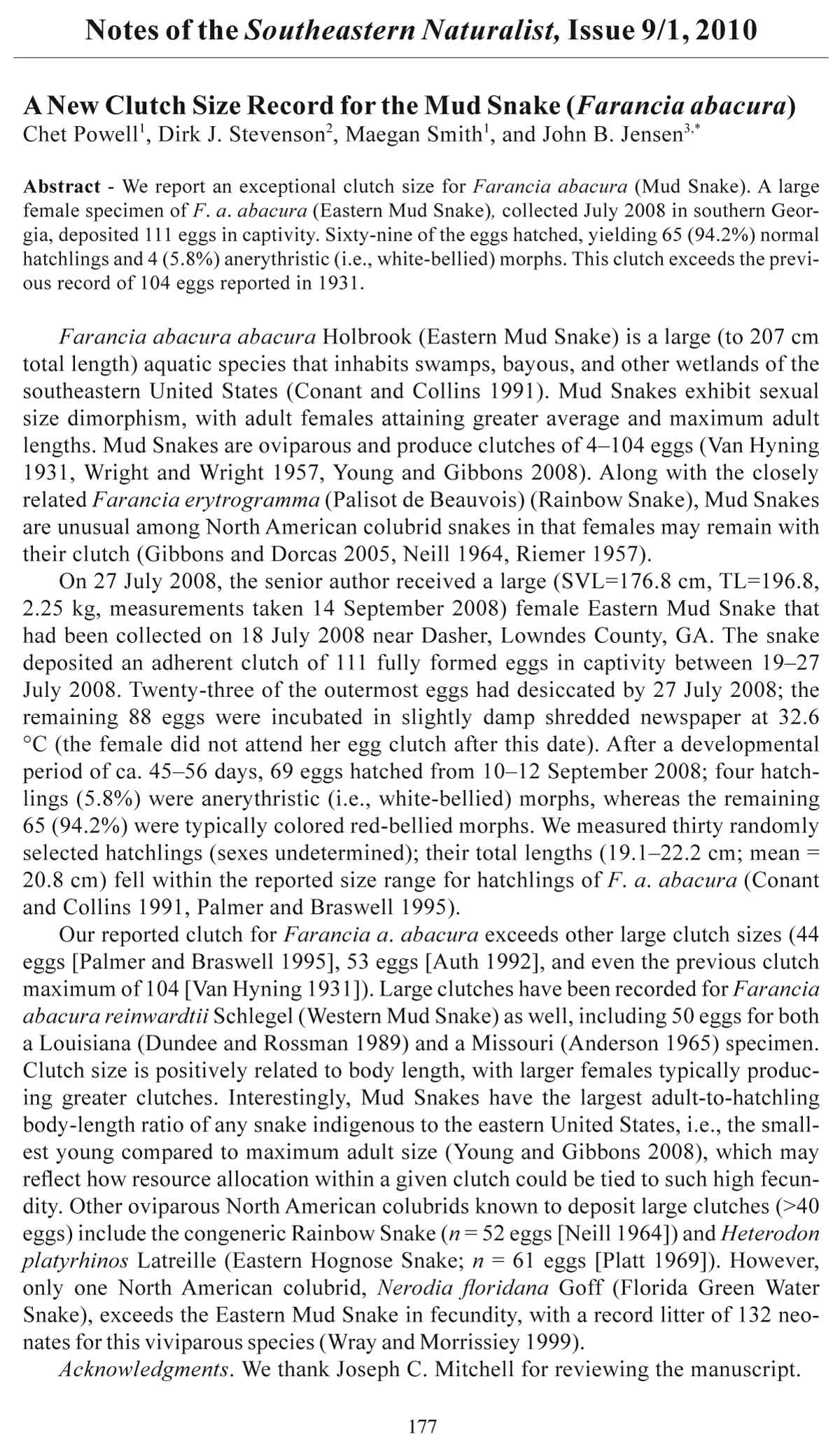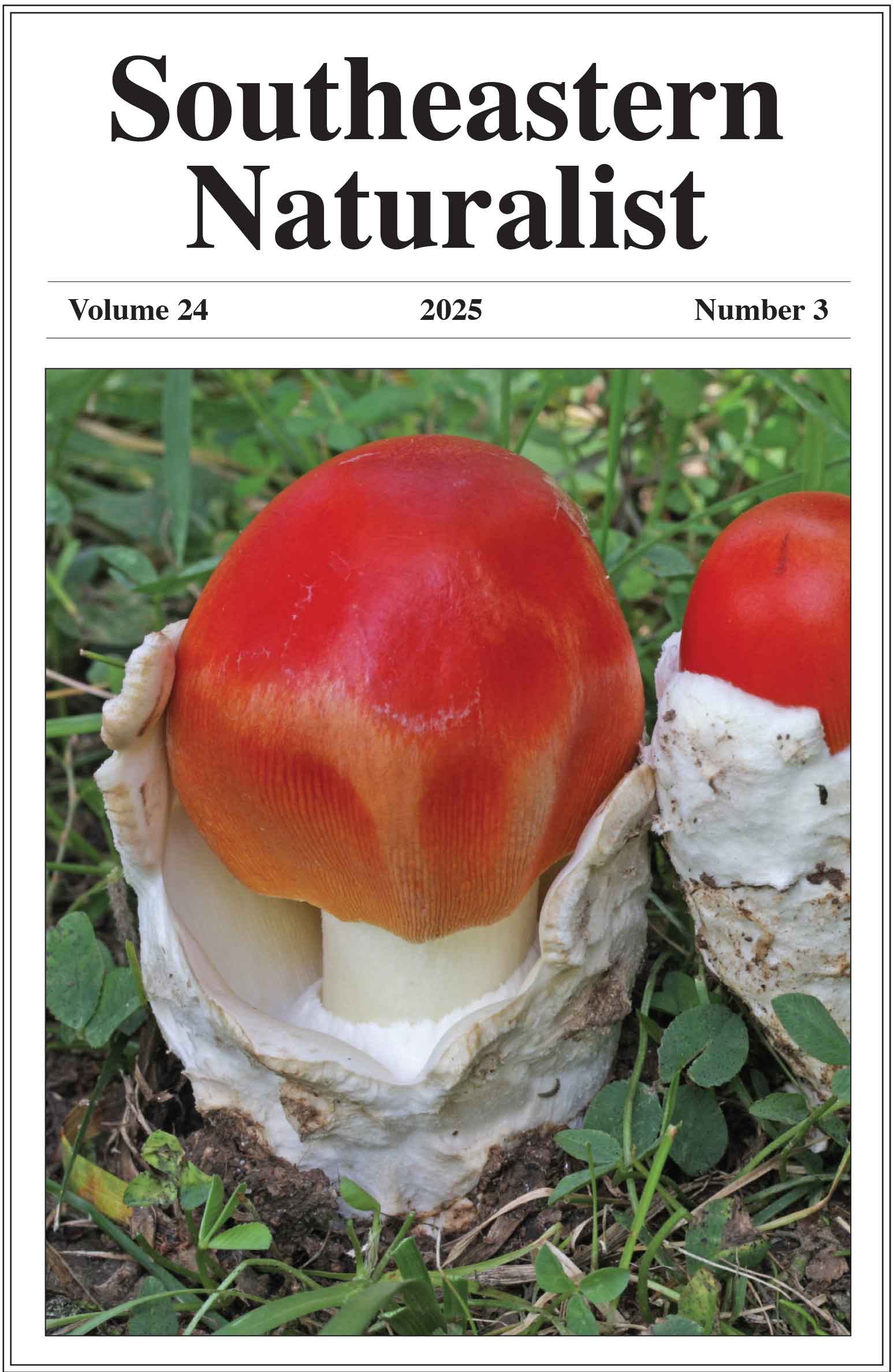A New Clutch Size Record for the Mud Snake (Farancia abacura)
Chet Powell1, Dirk J. Stevenson2, Maegan Smith1, and John B. Jensen3,*
Abstract - We report an exceptional clutch size for Farancia abacura (Mud Snake). A large
female specimen of F. a. abacura (Eastern Mud Snake), collected July 2008 in southern Georgia,
deposited 111 eggs in captivity. Sixty-nine of the eggs hatched, yielding 65 (94.2%) normal
hatchlings and 4 (5.8%) anerythristic (i.e., white-bellied) morphs. This clutch exceeds the previous
record of 104 eggs reported in 1931.
Farancia abacura abacura Holbrook (Eastern Mud Snake) is a large (to 207 cm
total length) aquatic species that inhabits swamps, bayous, and other wetlands of the
southeastern United States (Conant and Collins 1991). Mud Snakes exhibit sexual
size dimorphism, with adult females attaining greater average and maximum adult
lengths. Mud Snakes are oviparous and produce clutches of 4–104 eggs (Van Hyning
1931, Wright and Wright 1957, Young and Gibbons 2008). Along with the closely
related Farancia erytrogramma (Palisot de Beauvois) (Rainbow Snake), Mud Snakes
are unusual among North American colubrid snakes in that females may remain with
their clutch (Gibbons and Dorcas 2005, Neill 1964, Riemer 1957).
On 27 July 2008, the senior author received a large (SVL=176.8 cm, TL=196.8,
2.25 kg, measurements taken 14 September 2008) female Eastern Mud Snake that
had been collected on 18 July 2008 near Dasher, Lowndes County, GA. The snake
deposited an adherent clutch of 111 fully formed eggs in captivity between 19–27
July 2008. Twenty-three of the outermost eggs had desiccated by 27 July 2008; the
remaining 88 eggs were incubated in slightly damp shredded newspaper at 32.6
°C (the female did not attend her egg clutch after this date). After a developmental
period of ca. 45–56 days, 69 eggs hatched from 10–12 September 2008; four hatchlings
(5.8%) were anerythristic (i.e., white-bellied) morphs, whereas the remaining
65 (94.2%) were typically colored red-bellied morphs. We measured thirty randomly
selected hatchlings (sexes undetermined); their total lengths (19.1–22.2 cm; mean =
20.8 cm) fell within the reported size range for hatchlings of F. a. abacura (Conant
and Collins 1991, Palmer and Braswell 1995).
Our reported clutch for Farancia a. abacura exceeds other large clutch sizes (44
eggs [Palmer and Braswell 1995], 53 eggs [Auth 1992], and even the previous clutch
maximum of 104 [Van Hyning 1931]). Large clutches have been recorded for Farancia
abacura reinwardtii Schlegel (Western Mud Snake) as well, including 50 eggs for both
a Louisiana (Dundee and Rossman 1989) and a Missouri (Anderson 1965) specimen.
Clutch size is positively related to body length, with larger females typically producing
greater clutches. Interestingly, Mud Snakes have the largest adult-to-hatchling
body-length ratio of any snake indigenous to the eastern United States, i.e., the smallest
young compared to maximum adult size (Young and Gibbons 2008), which may
refl ect how resource allocation within a given clutch could be tied to such high fecundity.
Other oviparous North American colubrids known to deposit large clutches (>40
eggs) include the congeneric Rainbow Snake (n = 52 eggs [Neill 1964]) and Heterodon
platyrhinos Latreille (Eastern Hognose Snake; n = 61 eggs [Platt 1969]). However,
only one North American colubrid, Nerodia fl oridana Goff (Florida Green Water
Snake), exceeds the Eastern Mud Snake in fecundity, with a record litter of 132 neonates
for this viviparous species (Wray and Morrissiey 1999).
Acknowledgments. We thank Joseph C. Mitchell for reviewing the manuscript.
Notes of the Southeastern Nat u ral ist, Issue 9/1, 2010
177
178 Southeastern Naturalist Notes Vol. 9, No. 1
Literature Cited
Anderson, P. 1965. The Reptiles of Missouri. University of Missouri Press, Columbia, MO.
330 pp.
Auth, D.L. 1992. Eastern Mud Snake (Farancia abacura abacura): Reproduction. Herpetological
Review 23:61.
Conant, R., and J.T. Collins 1991. A Field Guide to Reptiles and Amphibians of Eastern and
Central North America. Third Edition. Houghton Miffl in Co., Boston, MA. 450 pp.
Dundee, H.A., and D.A. Rossman. 1989. The Amphibians and Reptiles of Louisiana. Louisiana
State University Press, Baton Rouge, LA. 300 pp.
Gibbons, W., and M.E. Dorcas. 2005. Snakes of the Southeast. University of Georgia Press,
Athens, GA. 253 pp.
Neill, W.T. 1964. Taxonomy, natural history, and zoogeography of the Rainbow Snake, Farancia
erytrogramma (Palisot de Beauvois). American Midland Naturalist 71:257–295.
Palmer, W.M., and A.L. Braswell. 1995. Reptiles of North Carolina. University of North Carolina
Press, Chapel Hill, NC. 412 pp.
Platt, D.R. 1969. Natural history of the hognose snakes Heterodon platyrhinos and Heterodon
nasicus. University of Kansas Publications Museum of Natural History 18:253–420.
Riemer, W.J. 1957. The snake Farancia abacura: An attended nest. Herpetologica 13:31–32.
Van Hyning, O.C. 1931. Reproduction of some Florida snakes. Copeia 1931:59–60.
Wray, K.P., and F.M. Morrissiey. 1999. Florida Green Watersnake (Nerodia fl oridana): Reproduction.
Herpetological Review 30:47.
Wright, A.H., and A.A. Wright. 1957. Handbook of Snakes of the United States and Canada,
Volume 1. Comstock Publishing Associates, Cornell University Press, Ithaca, NY. 564 pp.
Young, C.A., and W. Gibbons. 2008. Mud Snake (Farancia abacura). Pp. 348–350, In J.B.
Jensen, C.D. Camp, W. Gibbons, and M.J. Elliott (Eds.). Amphibians and Reptiles of Georgia.
University of Georgia Press, Athens, GA.
1Reed Bingham State Park, 542 Reed Bingham Road, Adel, GA 31620. 2Project Orianne, Indigo
Snake Initiative, 414 Club Drive, Hinesville, GA 31313. 3Georgia Department of Natural
Resources, Nongame Conservation Section, 116 Rum Creek Drive, Forsyth, GA 31029. *Corresponding
author - john.jensen@gadnr.org.














 The Southeastern Naturalist is a peer-reviewed journal that covers all aspects of natural history within the southeastern United States. We welcome research articles, summary review papers, and observational notes.
The Southeastern Naturalist is a peer-reviewed journal that covers all aspects of natural history within the southeastern United States. We welcome research articles, summary review papers, and observational notes.